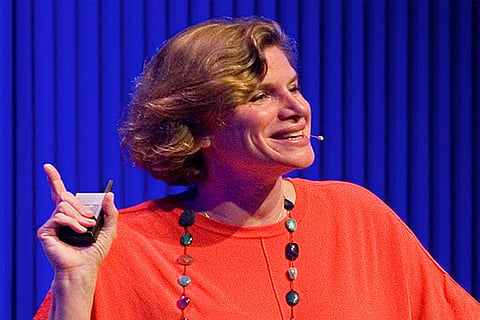

Chennai
Marrying one’s babysitter can cause the GDP to slide down; polluting the environment can make it surge. Now, if you are wondering about the connection of these activities with GDP, you need to listen to Mariana Mazzucato. In her 20-minute talk, the economist clarifies how value or wealth is created. She throws relevant data and shares information that takes viewers to historical periods dating back 300 years ago and back into modern times, and the global economic crisis that brought infamy to Goldman Sachs.
Given the global focus on recession, slowdown and the economic woes that countries have been facing, Mariana has her audience engaged in a conversation that could not have been more timely. Who would not like to know the impact of automation or the rise in the price of drugs or whether the stuff that is being produced is meeting the needs and wants that make people across the world purchase?
How can those who are classified as being productive be responsible for an economic catastrophe? This is when she draws attention to global brands like Goldman Sachs whose workforce is known for its productivity.
So what then triggered a scenario when thousands of people lost their homes? It did not stop there as within a year, in a month, 1.20 lakh people were homeless having to foreclose their mortgages. The data is mind-boggling as between 2007 and 2010, 8.8 million people lost their jobs. Mariana is quick to point out: “The bank also had to then be bailed out by the US taxpayer for the sum of $10 bn. We didn’t hear the taxpayers bragging that they were value creators, but obviously, having bailed out one of the biggest value-creating productive companies, perhaps they should have.”
Therefore, it is imperative for people to understand how the economic scenario changed from the era of physiocrats to the period when classical economists (like Adam Smith, Keynes) propounded their theories.
Like Smith’s remarkable example of the relevance of a pin factory, where 10 specialised workers could produce 4,800 pins a day compared to an unspecialised worker. Today, such a division of labour gets classified as ‘organisational innovation’, when neoclassical economists focus on productivity and growth. Mariana emphasises on finding the root behind economic value and the creators of the wealth.
She cites the example of share buy-back where the statistics are staggering. Who would have thought that 466 of S&P 500 companies could have spent over $4 trillion to buy back their own shares? So anyone interested to know the functions of data, GDP and other economic terms and how they impact existence and daily life, this Ted Talk is the one, a ready reckoner that one can bank upon.
SOURCE: bit.ly/34jOFzS
TITLE: What is economic value and who creates it
Synopsis: Mariana Mazzucato is dedicated to changing how policymakers understand the economy — and how we think about value — to make it harder for value extractors to pass for value creators. Mazzucato is a professor in the economics of innovation and public value at University College London, where she is founding director of the UCL Institute for Innovation & Public Purpose (IIPP).
QUOTEWORTHY: “Value creation. Wealth creation. These are powerful words. Maybe you think of finance, innovation, creativity. But who are the value creators? If we use that word, we must be implying that some people aren’t creating value. Who are they? Couch potatoes? Value extractors? Value destroyers? To answer this, we have to have a proper theory of value. As an economist to break it to you, we’ve kind of lost our way on this question.”
“So the big revolution that then happened – and this, by the way, is not often taught in economics classes – the big revolution that happened with the current system of economic thinking that we have, which is called “neoclassical economics,” was the logic completely changed. It changed in two ways. It changed from this focus on objective conditions to subjective ones.”
“Prices reveal value. The price of an antibiotic went up by 400 pc overnight, and the CEO was asked, ‘How can you do this? People need that antibiotic. That’s unfair.’ He said, ‘Well, we have a moral imperative to allow prices to go what the market will bear,’ completely dismissing the fact that in the US, for example, the National Institutes of Health spent over 30 bn a year on medical research that actually leads to these drugs.”
Visit news.dtnext.in to explore our interactive epaper!
Download the DT Next app for more exciting features!
Click here for iOS
Click here for Android